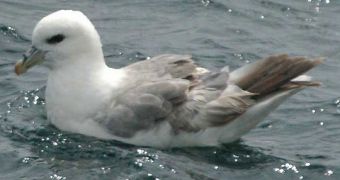A scientist from the University of British Columbia recently led a study aimed at measuring the levels of plastic pollution in the waters close to the North American coastline.
The end results of this research are quite alarming: presently, plastic pollution in this part of the world matches the one recorded in the North Sea, whose waters are world-wide known for containing significant amounts of plastic materials.
In order to draw clear-cut conclusions on the plastic pollution levels of North America's coast, the researchers focused on the fulmar population here.
Thus, as they explain, these birds are the ones that typically ingest most of the plastic materials floating about in our seas and oceans.
Therefore, by analyzing the content of their stomachs, one has access to crucial information regarding the overall levels of pollution. Terra Daily reports that Stephanie Avery-Gomm, one of the zoologists involved in this study, explained how, “Like the canary in the coal mine, northern fulmars are sentinels of plastic pollution in our oceans. Their stomach content provides a 'snapshot' sample of plastic pollution from a large area of the northern Pacific Ocean.”
By performing necropsies on 67 fulmars that died on natural causes, the researchers found that 92.5% of them had pieces of plastic materials in their stomach.
Further measurements indicated that, on average, each of the birds had lived with roughly 40 such pieces trapped inside their bodies.
The same source informs us that zoologists Stephanie Avery-Gomm also drew attention to the fact that “The average adult northern fulmar weighs five pounds, or 2.25 kilograms. While 0.385 grams in a bird may seem inconsequential to us, it's the equivalent of about five per cent of their body mass. It would be like a human carrying 50 grams of plastic in our stomach - about the weight of 10 quarters.”
Published in the journal Marine Pollution Bulletin, this study only goes to show that marine littering might soon become a global problem, and that waste reduction strategies need be implemented as soon as possible.

 14 DAY TRIAL //
14 DAY TRIAL //